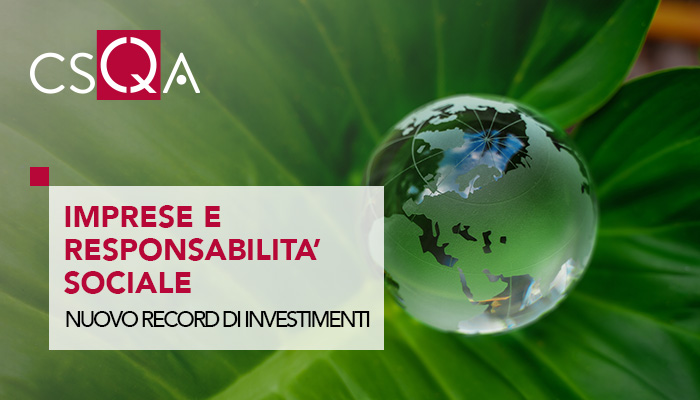
The data of the 10th Report on the social, economic and environmental commitment of companies in Italy, presented by the
Socialis Observatory , together with MSD Italia, Sogei, the Cap Group and the Prioritalia Foundation, speak for themselves. Those who do not want to be left behind push more and more on the values of
social responsibility and now adopt them without reservations, to be better on the market in a changing world. And the crises (from the pandemic to the war) do not seem to slow this trend.
We can say that
corporate social responsibility has become a duty , almost an obligation, if 96% of Italian companies with more than 80 employees (sample 400 companies) declare that they have spent almost 300 thousand euros a year (282 thousand euros to be exact) on Corporate Social Responsibility (CSR) activities: a total of 2 billion and 162 million euros in 2021, a value that has more than
quintupled in twenty years.
According to the Socialis Observatory survey, carried out by the Ixè Institute and illustrated in Sapienza University of Rome with the patronage of, among others, MITE, MEF, the Ministry of Labor and 34 Italian universities, the percentage of companies that has already confirmed the budget for 2022 is visibly increasing (65% compared to 40% in 2020); conversely, the share of companies that canceled or reduced the budget decreased (27%) and also the share that had not planned it in advance (6%). Data that seem to indicate a
regained ability to plan , beyond the emergency dimensions.
The average investment in CSR rose to 282 thousand euros compared to 241 thousand euros in 2019, with an increase of 17%. A trend that sees a 22% growth in the last two years alone and which demonstrates how consolidated and extensive the horizon of corporate social responsibility is today: from initiatives in favor of the local area and employees, it has expanded to all actions that produce and promote environmental and social sustainability, structurally embracing ESG criteria, which guide not only production and financing policies, but also responsible choices.
The objectives of the CSR
As regards the areas and methods of investment, according to the 10th Report of the Socialis Observatory, companies that carry out CSR activities concentrate, as in previous years, above all on
internal company initiatives (50%), such as those linked to personnel training (33%). 40% of companies promote initiatives dedicated to the national territory and 36% to the area close to their company. This year there has been an increase in actions aimed at foreign countries (21%), recording a possible return to what is commonly defined as 'charity', ie investments and donations in distant, poorer or more difficult countries. The largest investments are dedicated to actions to reduce the environmental impact: 40% invest to improve energy saving while 38% of companies favor investment actions in innovative technologies to limit
pollution and improve waste disposal.
The advantages: reputation, relations with the territory and with consumers
CSR proves to be convenient for companies that practice it: 44% of the companies interviewed indicate that CSR leads to an improvement in their
reputation and for 4 out of 10 companies it leads to an improvement in
staff motivation and the consequent improvement in the internal climate. The survey of opinions on CSR also shows that the attention of companies and consumers remains high. In fact, 51% of the companies interviewed believe that attention to CSR is growing. Finally, companies attribute a higher value to activities that benefit corporate governance and social issues, also known as ESG issues.
Investments in the various ESG parameters
The 10th CSR Report shows that 8 out of 10 managers believe that it is advantageous, as well as a duty, to invest in the protection of the
environment (reduction of CO2 emissions, energy efficiency and use of natural resources), in equal measure for their own
personnel and for
society , and in the same measure for corporate
governance (accounting transparency, professional ethics, solidity of the company's financial system, diversity policies, remuneration linked to ESG parameters).
The opportunity of the PNRR
In 2021, investments from the PNRR entered the scene that promise a strong boost to the world of sustainability and CSR. 85% of the large Italian companies interviewed believe in the incentive capacity of the PNRR towards sustainable practices, but of this largely majority segment 55% are interlocutory, they consider it a probability and not a certainty.
The business model
More than 8 out of 10 companies assume that in the near future CSR will be systemised and more organized in the business model of their company. A prediction shared above all by companies with large turnovers in the financial, commerce, electronics-IT-telecommunications, metallurgical, transport and services sectors.
The company manager
82% of the companies interviewed state that they have a function on their staff, a manager in charge of monitoring CSR and sustainability activities, confirming the rapidly growing trend. The maximum diffusion of this figure can be seen in the banking and insurance sectors, in the pharmaceutical chemical and metallurgy sectors. In 27% of cases it is a single figure who operates across the various departments. (Source: Roberto Orsi,
https://www.repubblica.it/ )
SHARE

